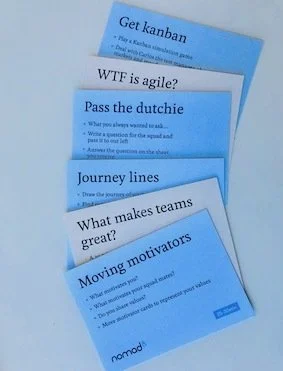Giving teams the best start
How you kick-off a team is important!
In fact it’s so important, that when you get it right your team can perform up to 30% better. That's what research by J. Richard Hackman tells us and it’s certainly consistent with my own observations.
What exactly is a kick-off?
A kick-off is a series of meetings where everyone associated with a team gets together to define the team's purpose, working agreements and principles for working together. During this time people get to know each other better and start building relationships.
Does it have to happen at the beginning?
Ideally it should happen at soon as a team is established, even before work begins. Kicking off without a clear purpose or working agreements will inevitably cause confusion and conflict down the track.
The good news is that it is (almost) never too late. A retroactive kick-off can help a team regroup and get back on track.
Diana Larsen and Ainsley Nies have evolved the kick-off concept and coined the term "liftoff": "Like a rocket a liftoff generates energy at the start of flight, giving people the force to overcome gravitational pull and boost themselves skyward."
When should I run a liftoff?
At the beginning of each new project
After each squadification or self-selection event
Any time there are major changes to team composition
Whenever the team needs a reset
How should I run a liftoff?
A liftoff is most successful when a team has the option to design their own sessions: choosing what they want to focus on, what they want to learn, and what’s important to to them.
Here’s how it works:
Teams book a liftoff day
They receive liftoff activity cards (see below) with a description and duration for each activity option
The team design their day (if they want to they check with me for recommendations)
We make it happen
A team’s liftoff day agenda
What's on the cards?
Over time I have collected a large number of activities for team building, learning and visioning. I have turned each of these activities or talks into a card:
Liftoff cards
Each card has a title, just enough of a description to have people make a valid choice and an approximate duration. Blue cards represent activities and orange cards are presentations or talks.
Some of the activities, like Jimmy cards or mob programming, are focused on team building. Others are focused on creating working agreements, like role expectation mapping, serious lego or choosing agile ingredients. Still others are about gaining or refreshing knowledge, such as a presentation on the science behind team design or a Scrum refresher.
I usually recommend a mix of presentations and activities.
Where can I get the liftoff cards?
You can download them here for free. Print them out onto small business card sized cards and schedule your liftoff day!
Where can I find out more about liftoffs?
There are lots of great ideas and design principles in Diana Larsen and Ainsley Nies book Liftoff - 2nd edition.
What next?
I hope you’ll find the liftoff cards useful. If you use them with your teams, add more activities or make changes - I’d love to hear about it! Let’s grow the deck!


